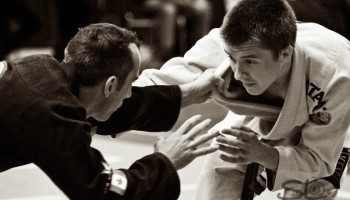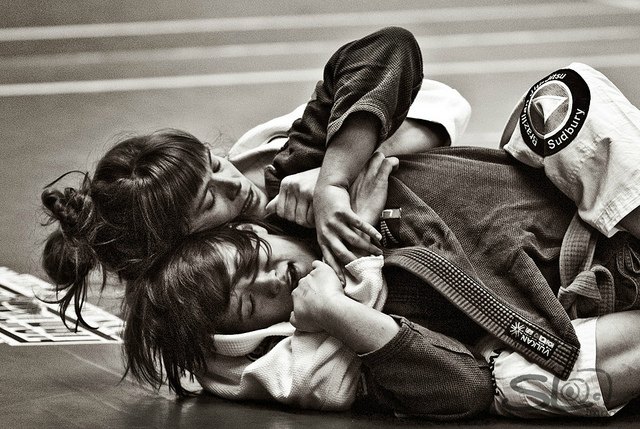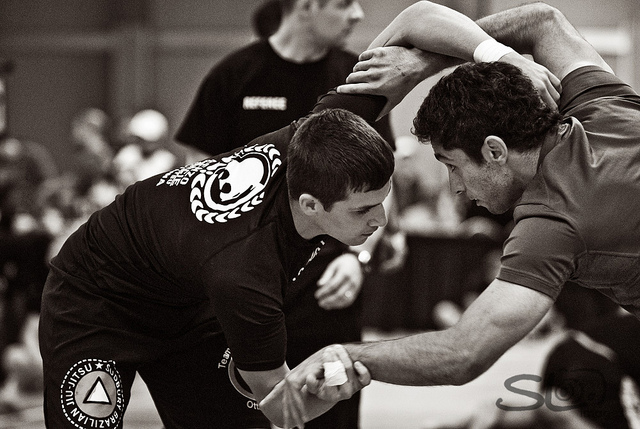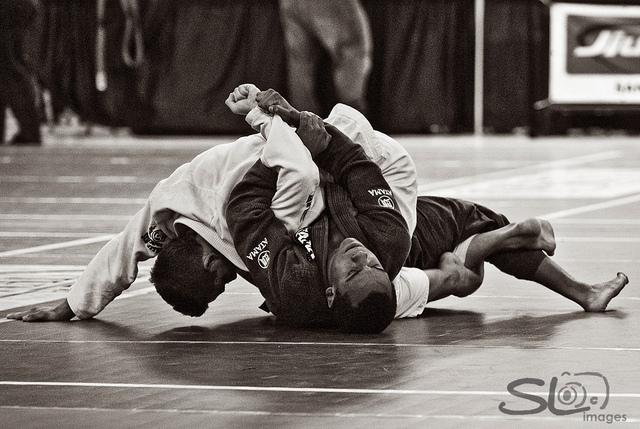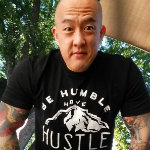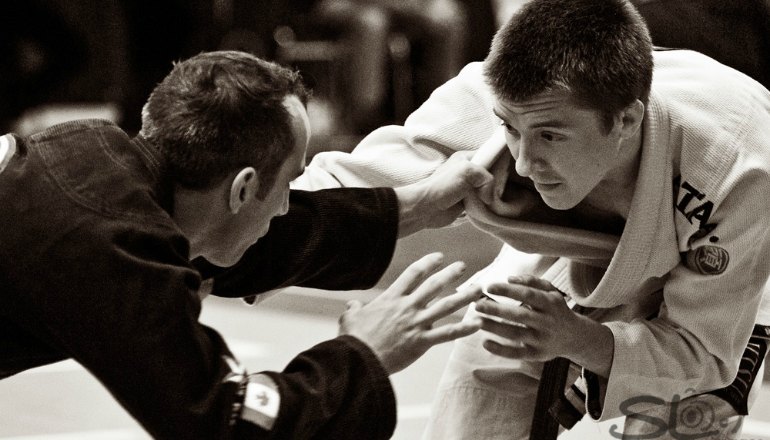 Reading Time: 8 minutes
Reading Time: 8 minutesSeveral years ago, I suffered a cervical herniation between my C5 and C6 vertebrae. It happened during sparring at my Brazilian jiu jitsu academy. I got caught in a guillotine and rather than tap, I tried to fight out of it. Why did I do that? Because I’m an idiot. More on that later.
As the day wore on, my neck became more and more stiff. The next day, I started to suffer from vertigo. That lasted a few days. Then my jaw started to ache with great throbbing waves of pain. That lasted a few more days. Then my arm started to tingle from my shoulder to my finger-tips.
At that point, I went to the doctor and got an MRI and an X-Ray. Staring at the X-Ray, I was stricken with a bizarre thought — no wonder my arm is tingling! The inside of my neck looks like a Big Mac that someone dropped on the floor and then stepped on. The disc is bulging out between the vertebrae like a burger protruding from the buns.
Most normal people with a Big Mac for a neck would probably have quit BJJ. That’s what my doctor wanted me to do. Pshaw! I may be an idiot, but I’m not a quitter! And anyway, BJJ is my magnificent obsession. When you are truly passionate about something you find a way to do it, obstacles be damned.
This is the story of how I found a way — in the hopes that it will help you find a way through the challenges you’re facing, whatever they may be.
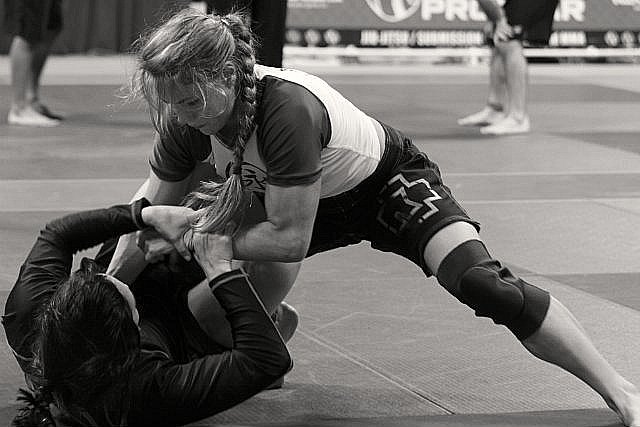
WLC contributor Sophia McDermott put in the practice to be a world champion.
The 10,000-Hour Rule
Most people are familiar with the 10,000-hour rule through Malcom Gladwell’s Outliers. Gladwell’s thesis rests on Anders Ericsson’s 1993 research on violin students that showed the players with the greatest accomplishments in concert settings had accumulated an average of 10,000 hours of practice by their twentieth birthday.
Other authors have run with this idea, including Daniel Coyne in The Talent Code and Geoff Colvin in Talent Is Overrated. The essence of these books is that talent is not a strong predictor of success. Success depends on accumulating a large volume of deliberate practice.
In the world of BJJ, the 10,000-hour rule is nothing new. But most people take the rule to mean that mastery in the sport requires 10,000 hours of mat time. And therein lay my challenge. With a serious neck injury, I needed to reduce mat time — and still improve at BJJ. How on earth could that be accomplished? (If you’re not into BJJ, hang in there — I promise this story will come around to you.)
Drillers Become Killers: the Power of Practice
I decided to try an experiment. Rather than accumulate hours on the mat, I decided to drill by myself and accumulate reps. I chose four techniques and committed to amassing 10,000 reps of each. Instead of sparring four or five times per week, I’d show up at the academy when the mats were empty and drill for an hour by myself.
I started my drilling regimen in April and I will freely admit that I doubted myself many times. I was sparring less frequently, and when I did spar during those early months, results were not encouraging. Every time I got smashed by a black belt, I would convince myself that drilling is for suckers and I should just give up.
But around August, I passed 2,500 reps on one of the techniques I’d been drilling, the butterfly sweep, and shortly after, I used that sweep to reverse an ultra-heavyweight who outweighs me by fifty pounds and outranks me by several degrees. This is someone who has been reliably kicking my ass for years, so when I was able to sweep him in pitched battle, I realized I was on to something.
I’m still nowhere near 10,000 reps on any of my techniques, but at this point all doubts have been removed. Drillers become killers. Which is not to say I’m anything special. I still get tooled, with dreary regularity, especially by upper belts. But at least now I can hang with, and occasionally submit, people who used to completely overwhelm me.
At this point, I want to take stock and share some of what I’ve learned from my deliberate practice experiment. While I am drilling in the narrow problem domain of BJJ, these ideas are applicable to anything in life, from weightlifting, to piano, to writing, or anything you want to do well.
Blunder Your Way to Success
Musicians learn pieces by first playing the right notes in the right order. Only then do they start to layer on tempo and dynamics. At these early stages, the sounds coming out of the practice room are appalling. But if you can’t play the right notes in the right order, nothing else matters, so musicians have to be extremely reductive.
A reductive mindset is one of the biggest benefits of drilling. Because nobody else is around to give you stage fright, you have the freedom to learn the right notes in the right order. You have the space to blunder your way to success.
Consider: How can you blunder your way toward your goal? Is there a first basic element you can practice when it comes to your passion?
Improve Across the Board
Months after I started my experiment, I still drill only four techniques. Nevertheless, I’ve improved at other techniques that I never practice. This was quite a head scratcher at first, but I think it makes sense if you consider most techniques share the same foundational movements.
For instance, hip escapes and arm bars both depend on hip extension. So when you drill the hip escape you are also grooving the movement you need to finish the arm bar. This is why gymnasts seem to pick up other sports so quickly. A guy who can do a front lever is going to be a kick-ass deadlifter or CrossFitter. And, to apply this to another realm, if you want to be a writer, any kind of focused writing practice is likely to help you get better at all your writing.
Consider: What can you practice daily that is foundational to your bigger goal?
Unconscious Competence
Before I started drilling I was a “conscious incompetent.” I knew I sucked at BJJ but couldn’t figure out why. After accumulating a thousand deliberate reps, I became a “conscious competent.” With concentration, I was able to perform a technique correctly. After thousands and thousands of reps, I have reached “unconscious competence,” meaning I can do my four techniques automatically, without having to think about them.
In BJJ this is very important because combat is inherently chaotic and if you have to think about what you’re going to do in a given situation, you’re always a step behind. Unconscious competence means you have an automatic reaction to a situation, which is how you get a step ahead.
Consider: What stage are you at right now when it comes to your activity of choice? Have you put in the “reps” required for the skills to become automatic?
Keys to Success
I hope at this point I’ve convinced you of the value of deliberate practice. You might even have something in mind that you’d like to tackle. If you do, here are some important keys to success:
- Don’t sweat the number. Research subsequent to Ericsson’s has cast some controversy around the 10,000-hour metric. What everyone agrees on is that in any problem domain, the path to mastery lies in deliberate practice — lots of it.
- But you do need a quantifiable goal. This is because good goals are measurable. A goal that isn’t measurable isn’t really a goal. It’s just an aspiration. For instance, becoming a writer is an aspiration. A goal is to write a 40,000-word draft of your first novel.
- And don’t lose count. Counting is hard, especially when you pass a few dozen reps. I won’t bore you with my many mishaps, but I will tell you that few things in life are as demoralizing as losing count when you are trying to track an important goal that spans months of effort. I tried a few volume-accumulation apps but none supported my use case. Eventually I became so irritated that I had to roll my own.
- Be prepared for burnout. One reason successful people succeed is because they don’t let themselves off the hook. But if preservation of sanity or health is at odds with your practice schedule, just give yourself a break. And then get back on the grind!
- Dealing with boredom. As long as your goal is truly your own, practice is one of the few times in life you get to do meditative self-work — and sincere self-work is rarely boring. If you really get bored practicing, you’re probably in the wrong field. Keep trying until you find your magnificent obsession.
EARN the Win
I’d like to close with the most important observation I’ve learned from my deliberate practice experiment. As someone with a little coaching experience, I can tell you that the practice mindset is absolutely critical to results, not just on the mats but in life. Do you want to lose weight but can’t? It’s your mindset. Do you want to finish your novel but find yourself binge watching Netflix? It’s your mindset. Do you want to get out of debt but keep sliding further into the hole? The key is in your mindset. The key is to harness the power of practice.
When you can’t seem to make progress towards your goals, more often than not it’s because you don’t believe you deserve to win. But after you have amassed hours and reps of deliberate practice, your mindset changes in a profound way. Deliberate practice instills in you the belief that you deserve to win. And that mindset is worth the grind.
